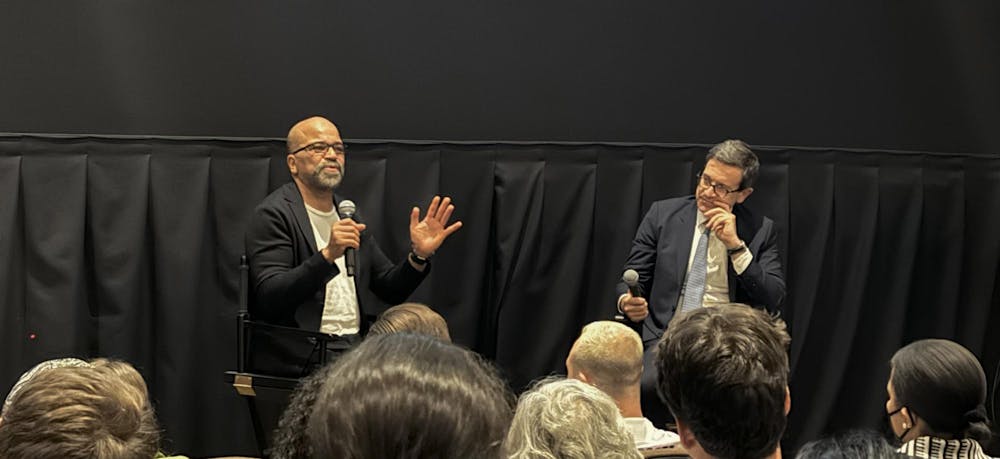Jeffrey Wright, star of the 2024 Academy Award-winning film, “American Fiction,” doesn’t think we Princeton students will take his advice. After all, as he said, we’re young. The celebrated actor is the father of two college-aged kids — he knows how stubborn young adults can be. However, it would be a mistake to not consider his words deeply. This is a man who has an impressive filmography: one that ranges from “Angels in America” to “The Hunger Games,” “James Bond” to “Westworld.” He has worked with the likes of legends such as Mike Nichols, Wes Anderson, M. Night Shyamalan, Sam Mendes, and Spike Lee; he was also cast in Lee’s remake of the Akira Kurosawa classic “High and Low” alongside Denzel Washington.
Most recently, Wright starred as writer Thelonious “Monk” Ellison in Cord Jefferson’s debut feature “American Fiction.” His performance earned him a nomination for the Academy Award for Best Actor. Meanwhile, Jefferson won Best Adapted Screenplay. On March 19, after an evening screening of his “American Fiction” at the Garden Theatre, Jeffrey Wright sat down with Julian E. Zelizer, Professor of History and Public Affairs at Princeton, for a Q&A session.
At the event, Wright was upfront with the fact that his work is eclectic — he told the audience that he loves to “inhabit other spaces,” while acknowledging “that’s probably too pretentious” but “magical.”
“If you can’t beat them, confuse them,” he continued.
Wright admitted, “I’ve talked too much in the last months,” now that awards season has come and gone. To him, an awards campaign is like a political campaign. It’s about swaying voters, but more importantly, it is about getting as many eyes on a film as possible. “American Fiction” was made on a relatively small budget of $7 million (Wright quipped that this was equivalent to the breakfast burrito budget on his recent blockbuster “The Batman”). For a movie of such a small budget, awards can help expand its viewership scope to a broader audience.
At the end of the day, Wright said that everyone who works on a film just wants to be recognized and affirmed, like the characters in “American Fiction.” Wright’s character, Monk, is an author frustrated with a literary establishment that often disregards his work. While the literary establishment expresses disinterest in Monk’s work (mostly modern adaptations of classical pieces from antiquity), it profits from narratives rooted in exhausted Black stereotypes. Under a pen name, Monk writes the exact kind of vulgar, heavy-handed, trope-riddled novel he lampoons. He submits the manuscript to publishers as an elaborate middle finger to their predominantly white executives. They love it, and the novel becomes a major hit. Monk must consequently reckon with his hypocrisy as money, film deals, and awards are poured upon him.
Wright and Jefferson constructed Monk to be an unreliable narrator. “American Fiction” tackles divisive, contemporary topics, especially focusing on art and the Black experience. However, the film is not a moralizing tale. Wright noted that the thesis of the film is not delivered by any of the characters in a verbose, theatrical argument. Rather, it lies somewhere in between their perspectives, or as Wright described, “on the table in front of them.” The only clarity in the narrative, then, is the tender journey that Monk takes to reconnect with his family. As Wright had put it, the film is also “about a man returning to love.”
The film is thought-provoking and demands discussion. It is a comedy, and Wright hopes that by “allowing us to laugh” the film “provides an open invitation” to discussion. Wright noted that people are often afraid to confront each other, but hopes that at Princeton we are more “sophisticated.” The opening scene of “American Fiction” is set in a college classroom as a contentious discussion ignites between Monk, a professor, and one of his students. This argument leads to Monk’s subsequent dismissal by the university. Clearly, the conversation does not go well for the film’s protagonist, but Wright believes that it is adeptly approached by Jefferson from a filmmaking perspective. It shows how quickly discourse can unravel when driven by stubbornness and hostility. Wright maintains that we should not be afraid of mature discourse, nor should we be afraid to satirize it in our art.
Critically, as Wright noted, we must also not be afraid to infuse challenging art with earnestness. This is, once again, shown through the core of “American Fiction” being Monk’s journey toward love. Wright argues that there is cynicism in our pop culture, a cheapness. During the discussion, he asked, “Where is the beauty?” He then proposed, to much applause, that “we need to get back to beauty, otherwise we are doomed.” He finds the Miles Davis cover of “Autumn Leaves,” which plays during the closing scene, to be the film’s most beautiful moment. The song comes from an era of pop culture that was unapologetically beautiful, and it perfectly contrasts the persistent tension of the film.
When asked if he had any advice for young people, Wright took the audience back to his college days. As an undergraduate at Amherst College, he switched majors from political science to theater (not much of a leap, he joked). At college, Wright had the opportunity to explore, which allowed him to progress towards his authentic self. By doing so, he nurtured his creativity. Wright urged all undergraduates to make mistakes — he claimed that there is no better time than now to do so. “Give thought to nonconformity … embrace it.” He continued, “Follow your own lead.” Take heed of this advice; it comes from one of the great artists of today.
Tyler Wilson is a senior writer for The Prospect and Humor at the ‘Prince.’ He can be reached at tyler.wilson@princeton.edu, or on Instagram at @tylertwilson.









